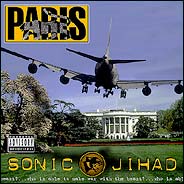
 |
| Guerrilla Funk Recordings |
| The rapper Paris plans to distribute his fifth CD, "Sonic Jihad," in the United States from his Web site starting in May. |
 OS ANGELES, April 2 — The rapper Paris has been working on his fifth CD for five years. Now, as he awaits cameos from fellow rappers like Public Enemy and Dead Prez to make his May release date, he feels that it his best work yet. It's a pity so few may ever hear it.
OS ANGELES, April 2 — The rapper Paris has been working on his fifth CD for five years. Now, as he awaits cameos from fellow rappers like Public Enemy and Dead Prez to make his May release date, he feels that it his best work yet. It's a pity so few may ever hear it.
This has nothing to do with record-label politics. Paris is releasing the CD himself. This has nothing to do with legal issues either. It has everything to do with the cover of the album, which few if any record store chains will carry. It depicts a jet about to slam into the White House. Making the album even less likely to appear on record store shelves is its title, "Sonic Jihad."
"The reason I have that cover art is not to offend the families of the victims of 9/11 or anything like that," Paris said by telephone from his home just outside Oakland. The intention, he said, was to create a dialogue.
"Nobody has profited from the tragedy of 9/11 more than the U.S. government, the Bush administration, defense contractors and large corporations," he continued. "So people can't look at me and say I'm capitalizing on this horrible event. That's not the case at all. In fact, I am using this as a means by which to reach people with the truth."
Several major record chains, when called for comment on the album, would not speak for attribution, for fear of criticism from free-speech groups. But all said they would carry the album only with an alternate cover. Independent record stores, however, seemed less concerned.
"I would need to check it out musically before anything else and see if the music would overshadow the cover art," said Bryce Holben, a buyer at Fat Beats, a hip-hop store in Greenwich Village. "Whether or not I agree with him, he has his voice and his politics. I wouldn't shun him for it."
When his first album, "The Devil Made Me Do It," was released in 1990 on Tommy Boy Records, Paris seemed like a sure contender for stardom. His voice, his rhymes, his beats and his intelligence all made him a favorite newcomer to the charts. But his strident politics and imagery, which he refused to compromise (leading to a video from that album being rejected by MTV), soon marginalized him. When Ice-T and his rock band Body Count were dropped from Time Warner after the fury over their song "Cop Killer," Paris was also refused distribution by the company. The offending song: "Bush Killa," a diatribe against the first President George Bush.
"I hate being in a position to say I told you so, because it means the world is really messed up," Paris said of his latest single, "What Would You Do," which largely rails against the current president.
Time has not blunted Paris's edge. Rather than tone down the cover of "Sonic Jihad," Paris has decided to release the album his way. Though four distributors in Europe agreed to carry the CD, he said, in the United States, where no store or distributor so far will touch it, he will sell it though his Web site, www.guerillafunk.com.
"Since I already know that out of the gate `Sonic Jihad' is not going to be in
It would be easy to write Paris off as a shameless provocateur. And some, after seeing the deliberately shocking artwork, do. After all, he is well aware that most people's first reaction to his album cover and title will be, in his word, "opposition." But a look at his Web site reveals a more complex character. A former stockbroker, he has posted a detailed money management and investment program, covering everything from setting up a 401(k) to creating a diversified portfolio. In the politics section, he narrates a documentary examining the events of 9/11, writes articles on what he sees as recent threats to civil liberties, urges rappers to research the exploitation of African workers in diamond mines before bragging about their newest jewels, and warns of the negative effects current hip-hop videos have on African-American teenagers.
"If you keep objectifying women in videos and endorsing black-on-black crime, then after a certain amount of time you become an enemy of the community," Paris said of some of his fellow rappers and the companies that release their records.
Paris left a distribution contract with Priority Records in 1995 because he didn't want to take his music in a more gangsta — and thus more commercial — direction. Since then he has been releasing his music independently. It seems as if the closer Paris has cleaved to his politics and beliefs, the less opportunity he has had to expose his message to a mass audience.
"At the end of the day, you got to do what lets you sleep well at night," Paris said of his decisions. "I want to look back at this particular period in my life and say that I made a difference and that I knew what was right — and that I did it in a way that was still bumping."